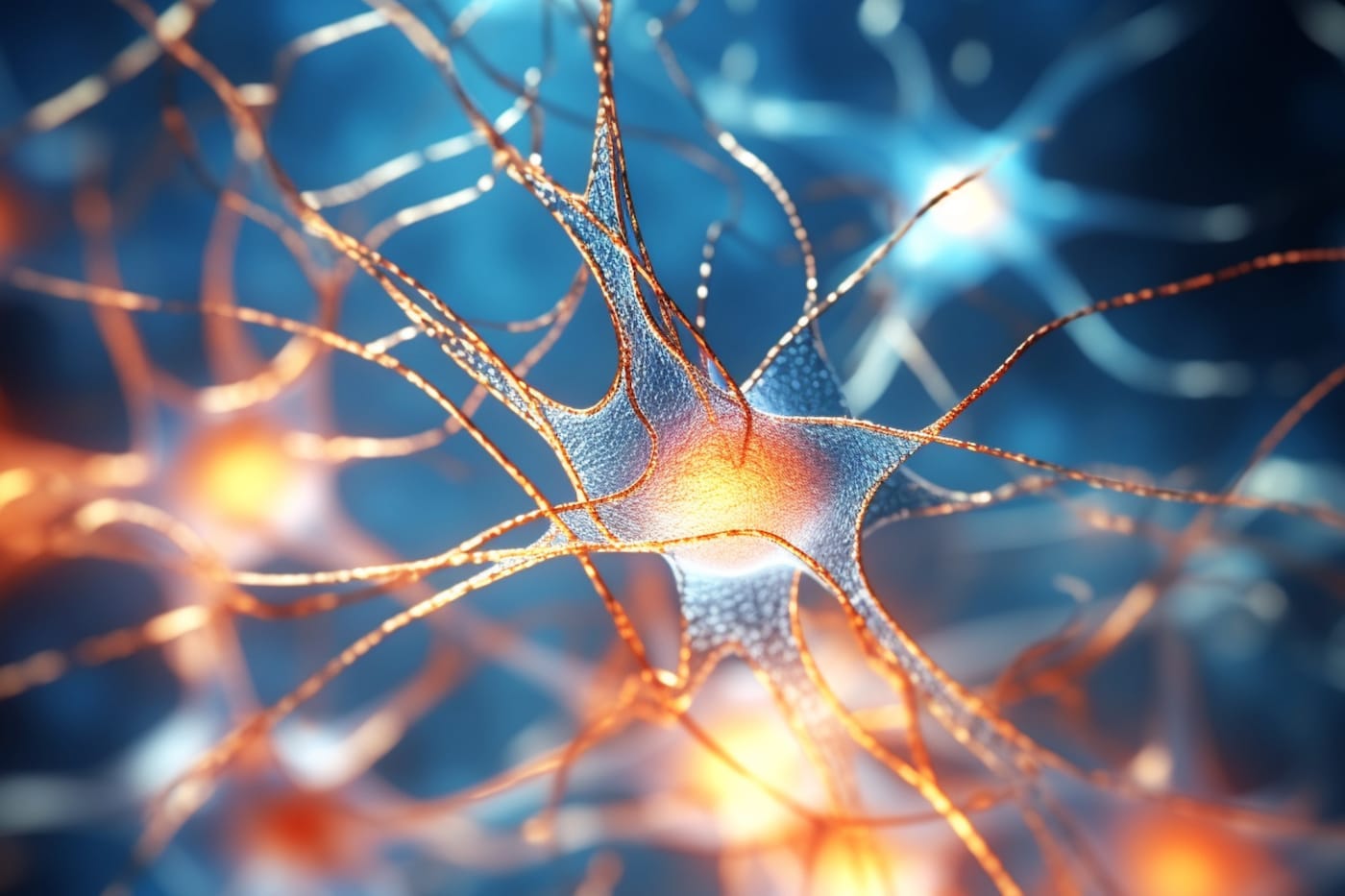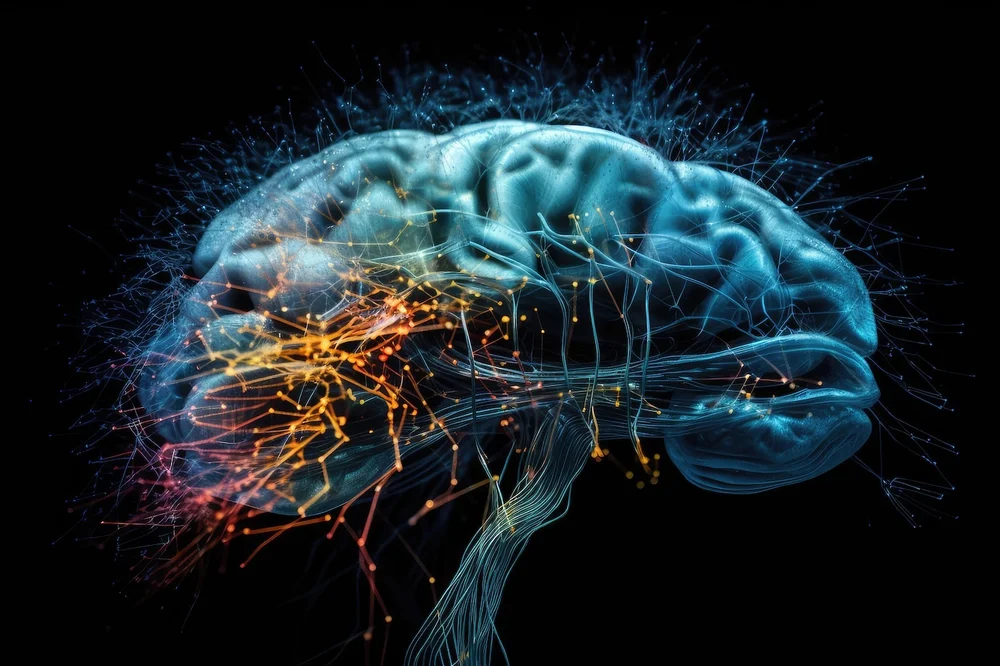Neurogenesis: What You Need to Know to Keep Your Brain Young!
Medically Reviewed by Dr. Nicole Avena
Ever wish you could slow down the aging process of your brain?
Imagine keeping your brain sharp, alert, and vibrant even in your later years. But is it possible to slow the rate at which your brain ages?
Let’s take a closer look at how new brain cells are formed (neurogenesis) and best natural ways to fight against brain aging.
What is Neurogenesis?
Neurogenesis, the process by which new neurons are created in the brain, has been a topic of significant interest and research in recent years. It plays a crucial role in brain development and function, as well as learning, memory, and overall brain health.
However, as we age, neurogenesis can decline, which may lead to decreased cognitive function and an increased risk of age-related memory issues.
Neurogenesis and Brain Function

Neurogenesis takes place primarily in two areas of the adult brain – the subventricular zone (SVZ) and the hippocampus. The SVZ is responsible for producing neurons involved in olfactory processing, while the hippocampus plays a critical role in memory formation and learning.
Research has shown that neurogenesis can help maintain plasticity within these regions, allowing them to continually adapt and change over time. This plasticity is essential for learning new information, as well as forming new memories.
Neurogenesis also has been linked to mood regulation through its impact on serotonin levels. Serotonin is a neurotransmitter associated with feelings of happiness and well-being. Reduced levels of serotonin may lead to mood issues, especially in older adults.
Interestingly, individuals with higher rates of neurogenesis tend to have lower rates of mood problems due to increased serotonin production.
Neurogenesis and Aging
Neurogenesis is vital for forming new connections between neurons and integrating them into existing neural networks. This allows us to learn and remember new information.
A decline in neurogenesis can reduce the brain’s ability to create these new connections, leading to a decreased capacity for learning and retaining new information. It also may impact our ability to adapt to changes and challenges as we age.
Several factors may contribute to the declining rate of neurogenesis with age. One is that there’s a decrease in stem cell proliferation in the hippocampus of aging individuals. Since stem cells are responsible for generating new neurons, their reduced activity can negatively affect neurogenesis.
Also, aging can cause inflammation in the brain, known as neuroinflammation. This inflammation response can cause damage to neurons resulting in reduced functionality or cell death.
What Can Inhibit Neurogenesis?
Various factors can negatively affect neurogenesis and accelerate the aging process of our brains. Here are just a few…
Aging
Since our body’s ability to produce new cells tends to decrease as we grow older, aging is one factor that can affect neurogenesis. Research has shown that there’s a decline in neurogenesis with advancing age, which can contribute to the cognitive decline seen in many older adults.
Lifestyle Factors
Lifestyle choices can have a significant impact on neurogenesis. For instance, excessive stress may reduce the production of new neurons in the hippocampus. On the flip side, regular exercise may enhance neurogenesis by promoting blood flow and releasing growth factors.
Nutrition plays a vital role in the process of neurogenesis. A diet rich in vitamins, minerals, and antioxidants may promote healthy brain cell growth, while diets high in saturated fats and processed sugars may have adverse effects on neuronal survival.
Environmental Factors
Environmental influences, such as exposure to toxins, can inhibit neurogenesis directly or indirectly through their effects on other systems like immune function or inflammation levels.
Constant exposure to air pollution may lead to reduced neurogenesis and an increased risk of neurological and memory issues.
Genetics and Epigenetics
Certain genetic factors may decrease neurogenesis, such as mutations in the genes responsible for producing growth factors that support neuronal maturation.
Additionally, epigenetic factors, which are changes in gene expression caused by environmental influences, also can influence neurogenesis. For example, prolonged stress can induce epigenetic changes that impair neurogenesis.
What Can Stimulate Neurogenesis?
While it’s natural for certain brain functions to worsen with age, there are ways to slow down the decline of neurogenesis.
Here are some lifestyle habits that may promote healthy neurogenesis as we age:
Regular Exercise
Physical activity isn’t just beneficial for our physical health, but also for our brains. Studies have shown that regular exercise increases levels of brain-derived neurotrophic factor (BDNF), a protein that promotes the survival and growth of new neurons. Exercise helps improve blood flow to the brain, which provides essential nutrients and oxygen necessary for neuronal growth.
Mental Stimulation
Challenging your brain with mentally stimulating activities such as puzzles, sudoku, and learning a new language, instrument, or sport may help to promote neurogenesis. These activities can help create new neural connections and strengthen existing ones.
Adequate Sleep
Sleep plays a vital role in brain function. During sleep, the brain consolidates memories and supports neuronal repair, allowing for optimal functioning. Lack of sleep may lead to decreased levels of BDNF, which can impair neurogenesis.
Stress Management
Intense stress may decrease levels of BDNF and hinder neurogenesis. Finding healthy ways to cope with stress – such as getting consistent exercise, spending time with loved ones, reading a book, or petting a pet – can help promote new neuronal growth.
Another important way to support neurogenesis is by maintaining a healthy diet.
5 of the Best Nutrients to Help Promote Neurogenesis and Slow Brain Aging
Nutrition and diet can play a crucial role in supporting brain health and potentially slowing down the aging process of the brain.
Here are some key nutrients that may help support neurogenesis.
- Omega-3 Fatty Acids
These healthy fats are essential for maintaining cognitive function and promoting neurogenesis. They can be found in cold-water fish such as salmon, sardines, and tuna, as well as in nuts and seeds like walnuts, flaxseeds, and chia seeds.
- Antioxidants
These powerful compounds help protect against oxidative stress, which can damage cells in the body and brain. Foods rich in antioxidants include dark leafy greens like spinach and kale, colorful fruits like oranges and kiwi, and vegetables like broccoli.
- B Vitamins
B vitamins are essential for energy production in brain cells. Foods rich in these vitamins include beans (lentils, chickpeas), leafy greens (spinach, collard greens), eggs, and lean meats (chicken, turkey).
- Curcumin
This compound, found in the spice turmeric, has anti-inflammatory and antioxidant properties, which can help protect against cognitive decline. Research shows that curcumin can promote neurogenesis and may even improve memory and attention. Turmeric can be incorporated into the diet by adding it to dishes such as curries, soups, or smoothies.
- Green Tea
This beverage is rich in polyphenols, a type of antioxidant that may help promote cognitive sharpness and neurogenesis. Regular consumption of green tea may reduce the risk of developing serious memory issues. For maximum benefits, aim for 2-3 cups per day.
In addition to incorporating these brain-boosting nutrients into your diet, it’s important to maintain an overall healthy and balanced diet by limiting processed foods, sugar, and alcohol intake. Keeping the body well-nourished with essential nutrients can help support brain health and potentially slow down the aging process of the brain.
Promote Healthy Neurogenesis
Neurogenesis is a complex process influenced by various factors such as age, lifestyle choices, environment, sleep quality, and genetics/epigenetics. Understanding these factors and taking steps to promote healthy neurogenesis with exercise, proper nutrition, stress management techniques, and quality sleep may help contribute to better overall brain health and reduce the risk of age-related cognitive decline or neurological problems.
While these healthy habits can help promote neurogenesis and slow down brain aging, it’s important to note that they may not completely prevent cognitive decline or memory loss.
Be sure to consult with a healthcare professional if you’re experiencing any concerning changes in cognitive function or memory.
At BrainMD, we’re dedicated to providing the highest purity nutrients to improve your physical health and overall well-being. For more information about our full list of brain healthy supplements, please visit us at BrainMD.
These statements have not been evaluated by the FDA. This content is for informational purposes only. It is not meant to substitute for medical or healthcare advice from a physician, nor is it intended to diagnose, treat, cure, or prevent any disease. Consult your healthcare provider before beginning a new health regimen.
- This Is What You Need to Know About HBOT
Medically Reviewed by Dr. Nicole Avena - April 22, 2024 - Hormone Changes in Men: How to Know If You Have Low Testosterone! - April 15, 2024
- This Is What You Need to Know About EMDR Therapy! - April 11, 2024




I’ve never understood what is meant by measuring tea in cups-per-day. It seems like the amount of tea leaves is more important than the amount of water. I don’t like green tea, but I drink black tea (I steep it 30 seconds to remove caffeine, first, then steep it 3 min more). Does it help also, or are we talking about different polyphenols?